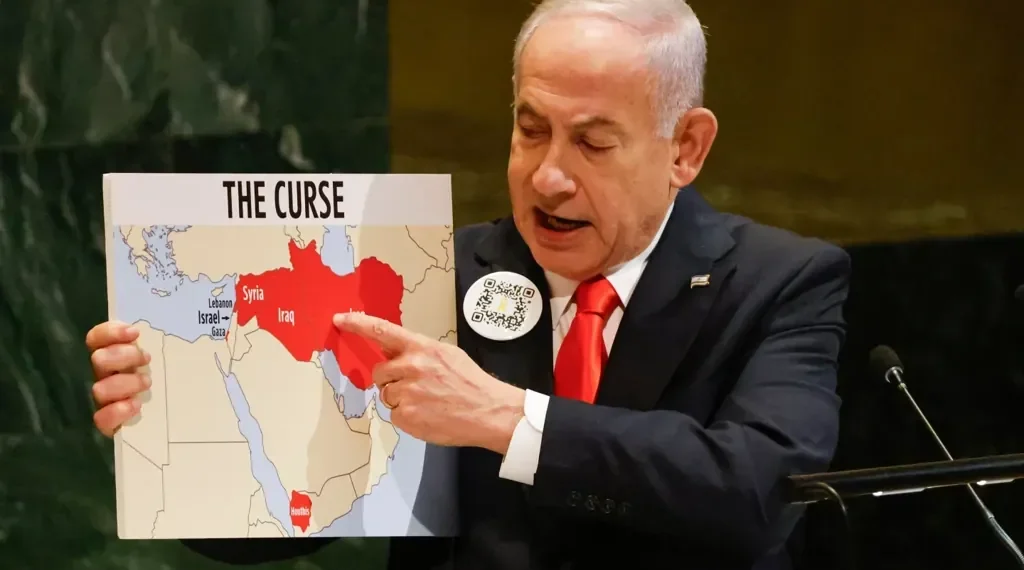Netanyahu defends Gaza war at UN, vows Israel “must finish the job” despite global walkouts, protests, and mounting calls for ceasefire.
Published: September 27, 2025, 14:00 EDT
NEW YORK — Israeli Prime Minister Benjamin Netanyahu delivered a defiant address at the United Nations General Assembly on Friday, vowing that Israel “must finish the job” against Hamas in Gaza despite mounting international isolation. His speech, marked by walkouts, protests, and accusations of war crimes, came as global calls intensify for an immediate ceasefire and recognition of Palestinian statehood.
Delegates Walk Out as Netanyahu Speaks
Netanyahu began his remarks to a partially empty UN hall after dozens of diplomats staged a walkout in protest. Seats reserved for major allies, including the United States and the United Kingdom, were occupied only by lower-level envoys, underscoring the diplomatic chill facing Israel. Iran’s delegation left behind images of children it said were killed in Gaza, highlighting the humanitarian toll of the conflict.
The prime minister accused critics of fueling antisemitism, stating: “Antisemitism dies hard. In fact, it doesn’t die at all.” He dismissed recent decisions by several countries to recognize Palestinian statehood, calling them “disgraceful” and claiming such moves would embolden terrorism.
War Framed as Regional Security Struggle
Throughout his address, Netanyahu presented Gaza as part of a broader regional conflict, citing Israeli military operations in Iran, Lebanon, Syria, and Yemen. He argued that Israel’s actions were essential to regional stability and peace, describing Hamas as the “final remnants” of a threat that must be eradicated.
Netanyahu also highlighted ongoing negotiations with Syria for security arrangements and praised former U.S. President Donald Trump, calling him a key ally in confronting regional adversaries.
Symbolism and Outreach Beyond the UN
In a bid to amplify his message, Netanyahu used visual props, including a map labeled “THE CURSE,” illustrating Israel’s security challenges. He also wore a pin containing a QR code linking to information about the October 7, 2023 Hamas attack, which sparked the current conflict.
His office claimed that Israel broadcast the speech into Gaza using loudspeakers and mobile phone networks. However, journalists inside Gaza reported no evidence of such transmissions.
Palestinians in Wadi Gaza reacted with frustration and fatigue. “Whether he likes it or not, sooner or later, the Palestinian people will gain independence,” said displaced resident Moneir Talib. Another resident, Amjad Abdel Daiym, added: “When he says he wants to eradicate Hamas, I only see that the war is continuing against poor people like us.”
Hamas and Palestinian Leaders Respond
Hamas dismissed Netanyahu’s address as a justification for prolonging the war. In a statement, the group said: “If he were truly concerned about captives, he would have stopped his brutal bombardment and the destruction of Gaza City. Instead, he lies and continues to endanger their lives.”
Palestinian Authority President Mahmoud Abbas, speaking by video to the assembly a day earlier, welcomed recent recognition of Palestinian statehood by countries including France, Canada, and Australia. He urged the international community to do more, saying: “The time has come for the world to do right by the Palestinian people.”
Mounting International Isolation
Israel faces unprecedented diplomatic pressure. Over 150 nations now recognize Palestinian statehood, while the European Union is weighing sanctions. The International Criminal Court has issued an arrest warrant for Netanyahu on charges of crimes against humanity, which he rejects. The International Court of Justice is separately considering a case accusing Israel of genocide, which it strongly denies.
The war, triggered by the Hamas attack in 2023 that killed around 1,200 people and saw more than 250 hostages taken, has since killed over 65,000 Palestinians, according to Gaza health officials. The United Nations estimates that 90% of Gaza’s population has been displaced, with widespread food shortages.
Protests and Polarization
As Netanyahu spoke, hundreds of pro-Palestinian protesters gathered outside the UN headquarters in New York. “Israel has chosen a war against every conscientious human being in this world,” said Nidaa Lafi of the Palestinian Youth Movement, drawing chants of “shame” from demonstrators.
Supporters, however, praised Netanyahu’s stance. UN Watch, a Geneva-based NGO, described his message as combining “defiance in the face of terror” with “a vision for peace with Arab neighbors, and even with a free Iran one day.”
The U.S. Balancing Act
While Washington remains Israel’s closest ally, cracks are emerging. Trump, set to meet Netanyahu on Monday, signaled limits to U.S. support. He said he would oppose any Israeli move to annex the occupied West Bank, despite calls from within Netanyahu’s government to do so.
Meanwhile, Israel has approved new settlement projects in the West Bank, a move critics argue undermines the possibility of a two-state solution. Netanyahu, however, rejected such a framework, claiming it would reward Hamas and weaken Israel’s security.
A Battle Framed as Global
Concluding his speech, Netanyahu positioned Israel’s war as part of a global fight against extremism. “You know deep down,” he told fellow leaders, “that Israel is fighting your fight.”
The remarks, delivered amid walkouts, protests, and legal challenges, underscored the isolation Israel now faces even as it presses ahead with its military campaign in Gaza.
This article was rewritten by JournosNews.com based on verified reporting from trusted sources. The content has been independently reviewed, fact-checked, and edited for accuracy, neutrality, tone, and global readability in accordance with Google News and AdSense standards.
All opinions, quotes, or statements from contributors, experts, or sourced organizations do not necessarily reflect the views of JournosNews.com. JournosNews.com maintains full editorial independence from any external funders, sponsors, or organizations.
Stay informed with JournosNews.com — your trusted source for verified global reporting and in-depth analysis. Follow us on Google News, BlueSky, and X for real-time updates.














